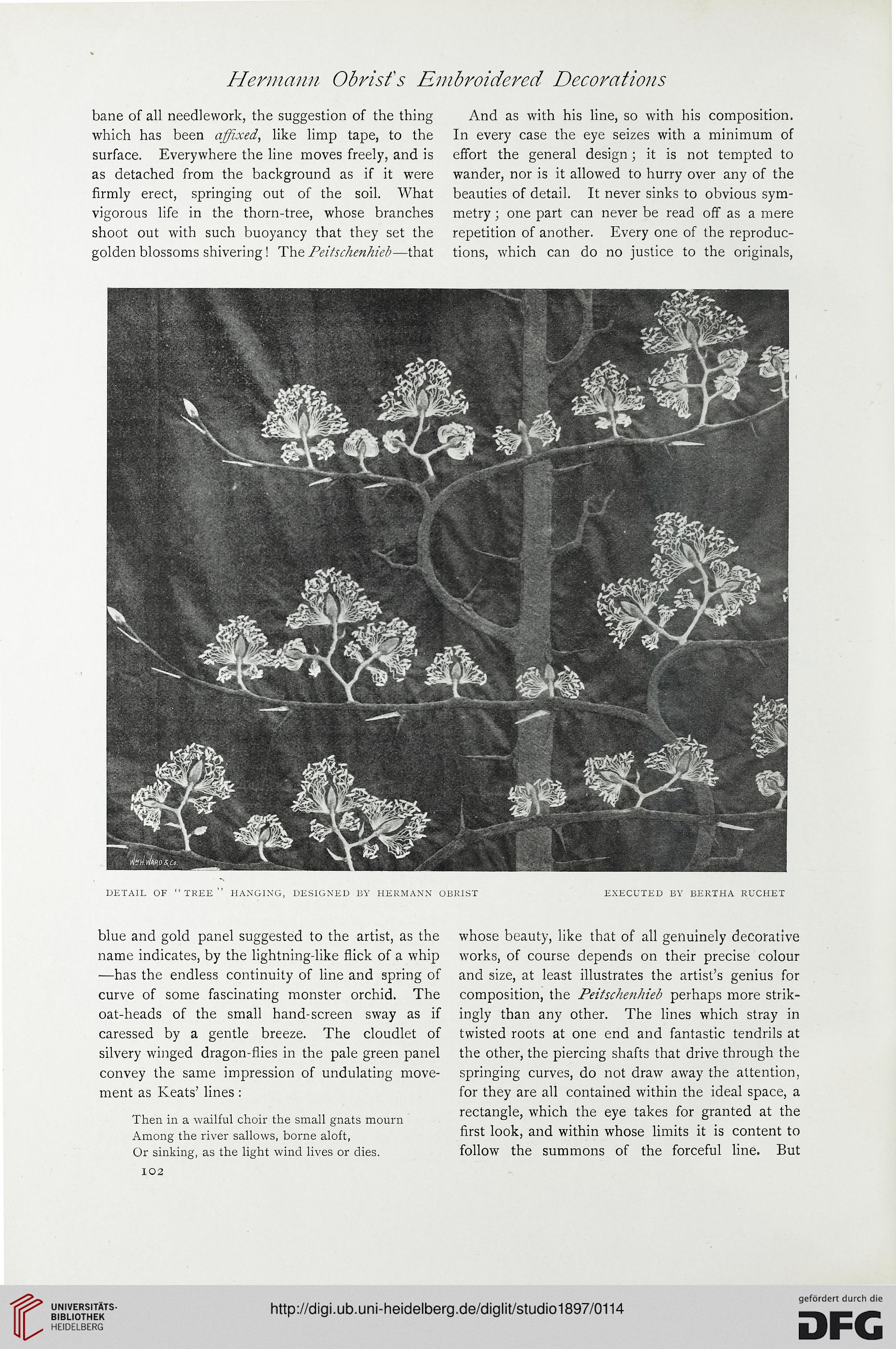Hermann Obrisfs Embroidered Decorations
bane of all needlework, the suggestion of the thing
which has been affixed, like limp tape, to the
surface. Everywhere the line moves freely, and is
as detached from the background as if it were
firmly erect, springing out of the soil. What
vigorous life in the thorn-tree, whose branches
shoot out with such buoyancy that they set the
golden blossoms shivering! The Peitschenhieb—that
And as with his line, so with his composition.
In every case the eye seizes with a minimum of
effort the general design; it is not tempted to
wander, nor is it allowed to hurry over any of the
beauties of detail. It never sinks to obvious sym-
metry ; one part can never be read off as a mere
repetition of another. Every one of the reproduc-
tions, which can do no justice to the originals,
DETAIL OF " TREE " HANGING, DESIGNED BY HERMANN OBR1ST EXECUTED BY BERTHA RUCHET
blue and gold panel suggested to the artist, as the
name indicates, by the lightning-like flick of a whip
—has the endless continuity of line and spring of
curve of some fascinating monster orchid. The
oat-heads of the small hand-screen sway as if
caressed by a gentle breeze. The cloudlet of
silvery winged dragon-flies in the pale green panel
convey the same impression of undulating move-
ment as Keats' lines :
Then in a wailful choir the small gnats mourn
Among the river sallows, borne aloft,
Or sinking, as the light wind lives or dies.
102
whose beauty, like that of all genuinely decorative
works, of course depends on their precise colour
and size, at least illustrates the artist's genius for
composition, the Peitschenhieb perhaps more strik-
ingly than any other. The lines which stray in
twisted roots at one end and fantastic tendrils at
the other, the piercing shafts that drive through the
springing curves, do not draw away the attention,
for they are all contained within the ideal space, a
rectangle, which the eye takes for granted at the
first look, and within whose limits it is content to
follow the summons of the forceful line. But
bane of all needlework, the suggestion of the thing
which has been affixed, like limp tape, to the
surface. Everywhere the line moves freely, and is
as detached from the background as if it were
firmly erect, springing out of the soil. What
vigorous life in the thorn-tree, whose branches
shoot out with such buoyancy that they set the
golden blossoms shivering! The Peitschenhieb—that
And as with his line, so with his composition.
In every case the eye seizes with a minimum of
effort the general design; it is not tempted to
wander, nor is it allowed to hurry over any of the
beauties of detail. It never sinks to obvious sym-
metry ; one part can never be read off as a mere
repetition of another. Every one of the reproduc-
tions, which can do no justice to the originals,
DETAIL OF " TREE " HANGING, DESIGNED BY HERMANN OBR1ST EXECUTED BY BERTHA RUCHET
blue and gold panel suggested to the artist, as the
name indicates, by the lightning-like flick of a whip
—has the endless continuity of line and spring of
curve of some fascinating monster orchid. The
oat-heads of the small hand-screen sway as if
caressed by a gentle breeze. The cloudlet of
silvery winged dragon-flies in the pale green panel
convey the same impression of undulating move-
ment as Keats' lines :
Then in a wailful choir the small gnats mourn
Among the river sallows, borne aloft,
Or sinking, as the light wind lives or dies.
102
whose beauty, like that of all genuinely decorative
works, of course depends on their precise colour
and size, at least illustrates the artist's genius for
composition, the Peitschenhieb perhaps more strik-
ingly than any other. The lines which stray in
twisted roots at one end and fantastic tendrils at
the other, the piercing shafts that drive through the
springing curves, do not draw away the attention,
for they are all contained within the ideal space, a
rectangle, which the eye takes for granted at the
first look, and within whose limits it is content to
follow the summons of the forceful line. But




